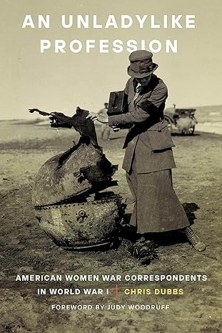- from Amazon:

Here is an interesting history of the U.S. Army Nurse Corps during the First World War. The author, Robert Ginsburgh, delves into how many nurses served, how many were killed, how they were recruited and trained, where they served in Europe, and the decorations they earned. The attached news article from 1917 reported on the a Russian combat unit that consisted entirely of women soldiers called "The Battalion of Death": "The courage of the Battalion of Death when the actual test came is the subject of many enthusiastic Petrograd dispatches. They behaved splendidly under fire, penetrating into a first-line trench of the Germans and brought back prisoners."
"Well, Monsieur, did I ever tell you about the time I was a Doughboy in the Great war?"
This is the story of Marie Marvingt (1875 – 1963), an amazing French woman who did indeed serve in the forward trenches disguised as a man during the Summer of 1917. "The essential facts are that women can do men's heavy work with substantially equal output, without any disturbance of the particular industry, and, when guided by proper conditions, without detriment to their health. How far and how long they ought to do it in the emergency arising from the war is to be decided upon different grounds."
Click here to read about the women war workers of the Second World War.
- from Amazon:

Here is a segment from a longer article published in 1951 by an anonymous American woman who wished to be known to her readers only as a woman who had "grown up with the Century" (born in 1900). In this column she insisted that it was the First World War that served as the proving ground where American women showed that they were just as capable as their brothers - and thus deserving of a voice in government. "Woman's hour has come! One of the splendid things that have come out of the bloody carnage of war to challenge the admiration of the world is the heroic exhibition of physical strength and courage shown by the women of the belligerent countries. They are doing more than merely substituting at men's work. In England they are winning their struggle for equality with men."
Click here to read about the lot of French women during the First World War.
|